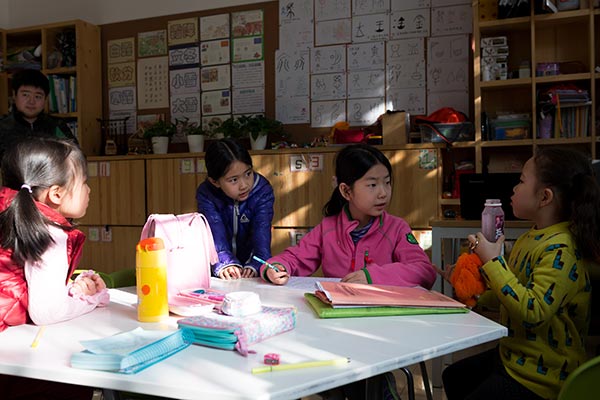Learning to teach and learn outside the box
By Liu Wei ( China Daily ) Updated: 2017-03-11 08:59:18
 |
|
Students discuss with each other during a class break. [Photo by Wu Kaixiang/China Daily] |
Parents, especially those with an innovative mindset, are clamoring to enroll their children at ETU, but it's still a boutique school with 31 pupils.
It also costs up to 150,000 yuan a year, more than double the average annual Chinese household income. Critics claim ETU serves only the wealthy, but Li says running an innovative private school has significant costs, including staff and operating expenses. "We are a small school now, but we hope to reproduce our ecosystem through innovative practices. ETU is open to all partners and expects to be embraced by more schools, so if a public school is willing to cooperate even just in some aspects, we could make it happen via a project or even government procurement process," says Li.
ETU has already initiated a partnership with a public school for teacher development and core teaching skills training. And it has a bigger ambition: to break the barriers between urban and rural schools and promote education equality.
Late last year, Ye Huimin, a rural teacher in Jiangxi, wrote to ETU, hoping to introduce its innovative methods and resources to rural areas and better tap the creativity of teachers. ETU supports the idea, but rather than replicating ETU in rural areas, they will support teachers like Ye by providing resources and training.
And the future? "ETU plans to extend to middle schools, but no one can tell what a future gaokao will look like. In 12 years, it might look different from today," Li says.
"We can't decide what 6-year-olds should learn based on the current evaluation and assessment system. We believe that as long as our children are sound in body and mind, acquire core competences and have the right values and perspectives, they will thrive, or at least qualify by any sensible standard anywhere in the world, even the gaokao."
|
|
|
|
|
|
|
|

























 Raymond Zhou:
Raymond Zhou: Pauline D Loh:
Pauline D Loh: Hot Pot
Hot Pot Eco China
Eco China China Dream
China Dream China Face
China Face






